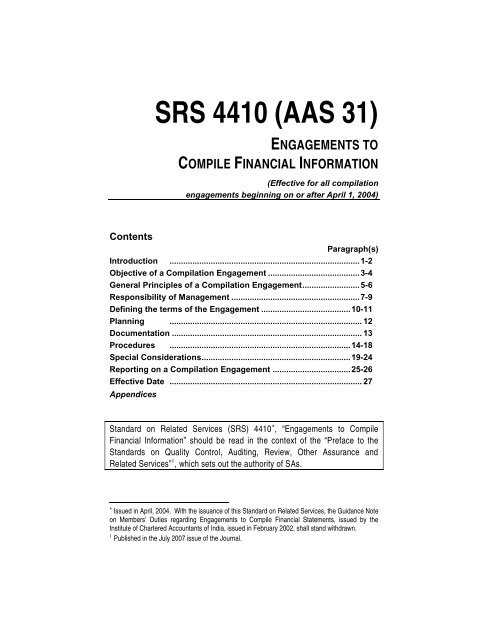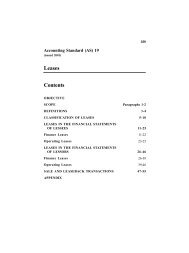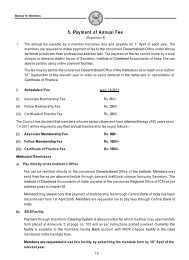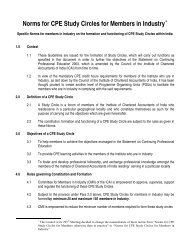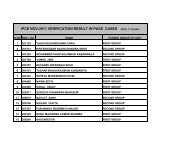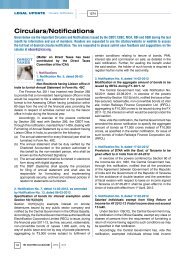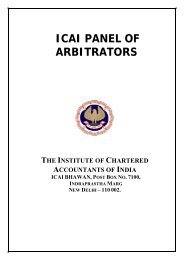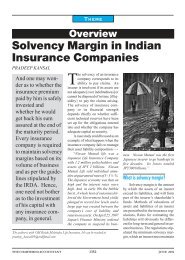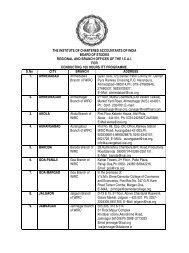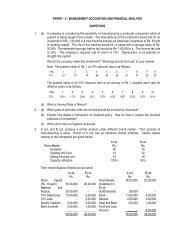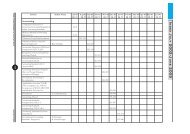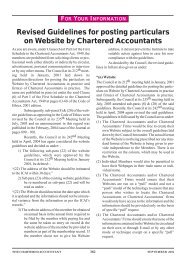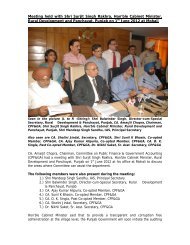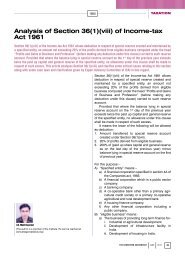srs 4410 (aas 31) engagements to compile financial information
srs 4410 (aas 31) engagements to compile financial information
srs 4410 (aas 31) engagements to compile financial information
You also want an ePaper? Increase the reach of your titles
YUMPU automatically turns print PDFs into web optimized ePapers that Google loves.
Contents<br />
SRS <strong>4410</strong> (AAS <strong>31</strong>)<br />
ENGAGEMENTS TO<br />
COMPILE FINANCIAL INFORMATION<br />
(Effective for all compilation<br />
<strong>engagements</strong> beginning on or after April 1, 2004)<br />
Paragraph(s)<br />
Introduction ...................................................................................1-2<br />
Objective of a Compilation Engagement ........................................3-4<br />
General Principles of a Compilation Engagement.........................5-6<br />
Responsibility of Management ........................................................7-9<br />
Defining the terms of the Engagement .......................................10-11<br />
Planning .................................................................................... 12<br />
Documentation ................................................................................... 13<br />
Procedures ...............................................................................14-18<br />
Special Considerations.................................................................19-24<br />
Reporting on a Compilation Engagement ..................................25-26<br />
Effective Date .................................................................................... 27<br />
Appendices<br />
Standard on Related Services (SRS) <strong>4410</strong> � , “Engagements <strong>to</strong> Compile<br />
Financial Information” should be read in the context of the “Preface <strong>to</strong> the<br />
Standards on Quality Control, Auditing, Review, Other Assurance and<br />
Related Services” � , which sets out the authority of SAs.<br />
� Issued in April, 2004. With the issuance of this Standard on Related Services, the Guidance Note<br />
on Members’ Duties regarding Engagements <strong>to</strong> Compile Financial Statements, issued by the<br />
Institute of Chartered Accountants of India, issued in February 2002, shall stand withdrawn.<br />
� Published in the July 2007 issue of the Journal.
Introduction<br />
Engagements <strong>to</strong> Compile Financial Information<br />
1. The purpose of this Standard on Related Services (SRS) is <strong>to</strong> establish<br />
standards on professional responsibilities of an accountant 2 when an<br />
engagement <strong>to</strong> <strong>compile</strong> <strong>financial</strong> statements or other <strong>financial</strong> <strong>information</strong> is<br />
undertaken and the form and content of the report <strong>to</strong> be issued in connection<br />
with such a compilation so that the association of the name of the accountant<br />
with such <strong>financial</strong> statements or <strong>financial</strong> <strong>information</strong> is not misconstrued by<br />
a user of those statements or <strong>information</strong> as having been audited by him.<br />
2. This SRS is directed <strong>to</strong>wards the compilation of <strong>financial</strong> <strong>information</strong>.<br />
However, it should be applied <strong>to</strong> the extent practicable, <strong>to</strong> <strong>engagements</strong> <strong>to</strong><br />
<strong>compile</strong> non-<strong>financial</strong> <strong>information</strong>, provided the accountant has adequate<br />
knowledge of the subject matter in question. Engagements <strong>to</strong> provide limited<br />
assistance <strong>to</strong> a client in the preparation of <strong>financial</strong> statements (for example,<br />
selection of an appropriate accounting policy), do not constitute an<br />
engagement <strong>to</strong> <strong>compile</strong> <strong>financial</strong> statements. This SRS should be read in<br />
conjunction with the “Framework of Statements on Standard Auditing<br />
Practices and Guidance Notes on Related Services 3 ”.<br />
Objective of a Compilation Engagement<br />
3. The objective of a compilation engagement is for an accountant <strong>to</strong><br />
use accounting expertise, as opposed <strong>to</strong> auditing expertise, <strong>to</strong> collect,<br />
classify and summarise <strong>financial</strong> <strong>information</strong>. This ordinarily entails<br />
reducing detailed data <strong>to</strong> a manageable and understandable form without the<br />
requirement <strong>to</strong> test the assertions underlying that <strong>information</strong>. The<br />
procedures employed are not designed and do not enable the accountant <strong>to</strong><br />
express any assurance on the <strong>financial</strong> <strong>information</strong>. However, users of the<br />
<strong>compile</strong>d <strong>financial</strong> <strong>information</strong> derive some benefit as a result of the<br />
accountant’s involvement because the service has been performed with<br />
professional competence and due care.<br />
4. A compilation engagement would ordinarily include the preparation of<br />
<strong>financial</strong> statements (which may or may not be a complete set of <strong>financial</strong><br />
2 For the purpose of this Standard on Related Services and <strong>to</strong> distinguish between an audit<br />
and a compilation engagement, the term ‘accountant’ (rather than ‘audi<strong>to</strong>r’) has been used<br />
throughout <strong>to</strong> refer <strong>to</strong> a member of the Institute in practice.<br />
3 The Framework issued in 2001 has been withdrawn pursuant <strong>to</strong> the issuance of the<br />
“Framework for Assurance Engagements”, which is applicable from April 1, 2008. The text of the<br />
Revised Framework is reproduced elsewhere in this Handbook.<br />
VI-13<br />
SRS <strong>4410</strong>
Handbook of Auditing Pronouncements-I<br />
statements) but may also include the collection, classification and<br />
summarisation of other <strong>financial</strong> <strong>information</strong>, for example, preparation of<br />
quarterly <strong>financial</strong> results, restatement of <strong>financial</strong> statements in accordance<br />
with a <strong>financial</strong> reporting framework other than in accordance with which the<br />
<strong>financial</strong> statements <strong>to</strong> be restated are already prepared and presented.<br />
General Principles of a Compilation Engagement<br />
5. The accountant should comply with the “Code of Ethics” issued by<br />
the Institute of Chartered Accountants of India. The ethical principles<br />
governing the accountant’s professional responsibilities for this type of<br />
engagement are:<br />
(a) Integrity;<br />
(b) Objectivity;<br />
(c) Professional competence and due care;<br />
(d) Confidentiality;<br />
(e) Professional conduct; and<br />
(f) Technical standards.<br />
Independence is not a requirement for a compilation engagement. However,<br />
where the accountant is not independent, a statement <strong>to</strong> that effect<br />
should be made in the accountant’s report.<br />
6. In all circumstances when an accountant’s name is associated with<br />
<strong>financial</strong> <strong>information</strong> <strong>compile</strong>d by him, the accountant should issue a<br />
report.<br />
Responsibility of Management<br />
7. The management is responsible for taking reasonable steps <strong>to</strong> prevent<br />
and detect errors, fraud or other irregularities. This includes:<br />
a) Ensuring that the <strong>financial</strong> <strong>information</strong> generated in the entity is correct,<br />
complete and reliable;<br />
b) Maintaining adequate accounting and other records and internal controls<br />
and selecting and applying appropriate accounting policies;<br />
SRS <strong>4410</strong> VI-14
Engagements <strong>to</strong> Compile Financial Information<br />
c) Establishing controls designed <strong>to</strong> safeguard the assets of the entity and<br />
also <strong>to</strong> deter fraudulent or other dishonest conduct and <strong>to</strong> detect any<br />
fraud that occurs;<br />
d) Establishing controls <strong>to</strong> provide reasonable assurance that the entity<br />
complies with laws and regulations applicable <strong>to</strong> its activities, or for<br />
detecting any non-compliance with laws or regulations that occurs.<br />
8. A compilation engagement cannot be regarded as providing assurance<br />
on the adequacy of the client’s internal control systems or on the actual<br />
incidence of fraud or non-compliance with laws and regulations. A<br />
compilation engagement carried out by the accountant does not relieve the<br />
management of these responsibilities.<br />
9. The management is also responsible for preparation and presentation of<br />
<strong>financial</strong> statements or other <strong>financial</strong> <strong>information</strong> in accordance with the<br />
applicable laws and regulations, if any. The accountant should,<br />
accordingly, obtain an acknowledgement from the management of its<br />
responsibility for the appropriate preparation and presentation of the<br />
<strong>financial</strong> statements or other <strong>information</strong> and of its approval of such<br />
<strong>information</strong> <strong>to</strong> be <strong>compile</strong>d. The accountant should also obtain an<br />
acknowledgement from management of its responsibility for the<br />
accuracy and completeness of the underlying accounting data and the<br />
complete disclosure of all material and relevant <strong>information</strong> <strong>to</strong> the<br />
accountant.<br />
Defining the Terms of the Engagement<br />
10. An engagement letter will be of assistance in planning the compilation<br />
work. The scope of a compilation engagement would, normally, be defined by<br />
the instructions of the client, though in certain cases, for example, in case of<br />
compilation of <strong>financial</strong> statements of a company, the form and content of<br />
such <strong>financial</strong> statements might be laid down under a statute. The<br />
accountant should, therefore, ensure that there is a clear understanding<br />
between the client and the accountant regarding the terms of the<br />
engagement by means of an engagement letter or such other suitable<br />
form of contract. Thus, it is in the interest of both the accountant and<br />
the entity that the accountant sends an engagement letter documenting<br />
the key terms of the appointment. An engagement letter confirms the<br />
accountant’s acceptance of the engagement and helps avoid<br />
VI-15<br />
SRS <strong>4410</strong>
Handbook of Auditing Pronouncements-I<br />
misunderstanding regarding matters such as the objective and scope of<br />
the engagement and the extent of the audi<strong>to</strong>r’s responsibilities.<br />
11. The engagement letter would include matters such as the following:<br />
(a) Nature of the engagement including the fact that neither an audit nor a<br />
review will be carried out and that accordingly no assurance will be<br />
expressed.<br />
(b) Fact that the engagement cannot be relied upon <strong>to</strong> disclose fraud or<br />
defalcations that may exist but that the accountant will bring <strong>to</strong> the<br />
attention of the management any such matter which might come <strong>to</strong> his<br />
attention during the course of his engagement.<br />
(c) Nature of the <strong>information</strong> <strong>to</strong> be supplied by the client.<br />
(d) Fact that management is responsible for:<br />
� the accuracy and completeness of the <strong>information</strong> supplied <strong>to</strong> the<br />
accountant, including maintenance of adequate accounting records<br />
and internal controls and selection and application of appropriate<br />
accounting policies.<br />
� preparation and presentation of the <strong>financial</strong> statements of the<br />
entity, in accordance with the applicable laws and regulations, if<br />
any.<br />
� safeguarding the assets of the entity and also establishing<br />
appropriate controls designed <strong>to</strong> prevent and detect fraud and<br />
other irregularities.<br />
� ensuring that the activities of the entity are carried in accordance<br />
with applicable laws and regulations and that it institutes<br />
appropriate controls <strong>to</strong> prevent and detect any non-compliance.<br />
� ensuring complete disclosure of all material and relevant<br />
<strong>information</strong> <strong>to</strong> the accountant.<br />
(e) Intended use and distribution of the <strong>information</strong>, once <strong>compile</strong>d.<br />
(f) Basis of accounting on which <strong>financial</strong> <strong>information</strong> is <strong>to</strong> be <strong>compile</strong>d and<br />
the fact that the basis, and any known departures therefrom, if any will<br />
be disclosed.<br />
(g) The fact that the management is responsible <strong>to</strong> the users for the<br />
<strong>information</strong> <strong>to</strong> be <strong>compile</strong>d by the accountant.<br />
SRS <strong>4410</strong> VI-16
Engagements <strong>to</strong> Compile Financial Information<br />
(h) Unrestricted access <strong>to</strong> whatever records, documents and other<br />
<strong>information</strong> is requested in connection with the compilation<br />
engagement.<br />
(i) Basis on which fees would be computed and any billing arrangements.<br />
(j) Request for the client <strong>to</strong> confirm the terms of engagement by<br />
acknowledging the receipt of the engagement letter.<br />
An example of an engagement letter for a compilation engagement appears<br />
in Appendix I.<br />
Planning<br />
12. The accountant should plan the work so that an effective<br />
engagement will be performed.<br />
Documentation<br />
13. The accountant should document matters, which are important in<br />
providing evidence that the engagement was carried out in accordance<br />
with this Standard on Related Services and the terms of the<br />
engagement.<br />
Procedures<br />
14. The accountant should obtain a general knowledge of the business<br />
and operations of the entity and should be familiar with the accounting<br />
principles and practices of the industry in which the entity operates and<br />
with the form and content of the <strong>financial</strong> statements/ other <strong>financial</strong><br />
<strong>information</strong> that is appropriate in the circumstances.<br />
15. To <strong>compile</strong> <strong>financial</strong> <strong>information</strong>, the accountant requires a general<br />
understanding of the nature of the entity’s business transactions, the form of<br />
its accounting records and the accounting basis on which the <strong>financial</strong><br />
<strong>information</strong> is <strong>to</strong> be presented. The accountant ordinarily obtains knowledge<br />
of these matters through experience with the entity or inquiry of the entity’s<br />
personnel.<br />
16. Other than as noted in this Standard on Related Services, the<br />
accountant is not, ordinarily, required <strong>to</strong>:<br />
VI-17<br />
SRS <strong>4410</strong>
Handbook of Auditing Pronouncements-I<br />
(a) make any inquiries of management <strong>to</strong> assess the reliability and<br />
completeness of the <strong>information</strong> provided;<br />
(b) assess internal controls;<br />
(c) verify any matters; or<br />
(d) verify any explanations.<br />
In a compilation engagement, an accountant would normally have <strong>to</strong> rely on<br />
the management for most of the <strong>information</strong> needed <strong>to</strong> <strong>compile</strong> the <strong>financial</strong><br />
statements or other <strong>financial</strong> <strong>information</strong>, including accounting estimates as<br />
well as the fact that the <strong>information</strong> given <strong>to</strong> the accountant is complete and<br />
reliable. The accountant should request management representation<br />
letter covering significant <strong>information</strong> or explanations given orally on<br />
which he considers representations are required.<br />
17. If the accountant becomes aware that the <strong>information</strong> supplied by<br />
management is incorrect, incomplete, or otherwise unsatisfac<strong>to</strong>ry, the<br />
accountant should consider performing the procedures listed in<br />
Paragraph 16 and request management <strong>to</strong> provide additional<br />
<strong>information</strong>. If management refuses <strong>to</strong> provide additional <strong>information</strong>,<br />
the accountant should withdraw from the engagement, informing the<br />
entity of the reasons for the withdrawal.<br />
18. The accountant should read the <strong>compile</strong>d <strong>information</strong> and consider<br />
whether it appears <strong>to</strong> be appropriate in form and free from obvious<br />
material misstatements. In this sense, material misstatements include:<br />
(a) mistakes in the application of the identified <strong>financial</strong> reporting<br />
framework.<br />
(b) non-disclosure of the <strong>financial</strong> reporting framework and any known<br />
departures therefrom.<br />
(c) non-disclosure of any other significant matters of which the accountant<br />
has become aware.<br />
The identified <strong>financial</strong> reporting framework and any known departures<br />
therefrom should be disclosed within the <strong>financial</strong> <strong>information</strong>, though<br />
their effects need not be quantified.<br />
SRS <strong>4410</strong> VI-18
Special Considerations<br />
Engagements <strong>to</strong> Compile Financial Information<br />
Clients Having an Identified Financial Reporting Framework<br />
19. As far as practicable, in case of compilation of <strong>financial</strong> statements<br />
prepared within an identified <strong>financial</strong> reporting framework 4 , the<br />
accountant should ensure that the <strong>financial</strong> statements or other<br />
<strong>financial</strong> <strong>information</strong> <strong>compile</strong>d comply with the requirements of the<br />
identified <strong>financial</strong> reporting framework. In case of any material<br />
departures from the requirements of the identified <strong>financial</strong> reporting<br />
framework, the fact should be stated in the Notes <strong>to</strong> the Accounts or<br />
other <strong>compile</strong>d <strong>financial</strong> <strong>information</strong> as well as in the accountant’s<br />
report on the compilation.<br />
Clients Having No Identified Financial Reporting Framework<br />
20. In case of clients for whom compliance with an identified <strong>financial</strong><br />
reporting framework is not required or the Accounting Standards issued by<br />
the Institute of Chartered Accountants of India are not manda<strong>to</strong>ry, the client<br />
may specify that the accounts should be <strong>compile</strong>d on, for example, based on<br />
the requirements of the Income Tax Act, 1961. However, since, accounts<br />
are normally assumed <strong>to</strong> be compliant with the generally accepted<br />
accounting practices, including the Accounting Standards issued by<br />
the Institute of Chartered Accountants of India, the different basis of<br />
compilation should be set out in the Notes <strong>to</strong> the Accounts or other<br />
<strong>compile</strong>d <strong>financial</strong> <strong>information</strong> as well as the report issued by the<br />
accountant on compilation.<br />
4 Paragraph 3 of the Framework for Statements on Standard Auditing Practices and Guidance<br />
Notes on Related Services states as follows:<br />
“Financial statements are ordinarily prepared and presented annually and are directed <strong>to</strong>ward the<br />
common <strong>information</strong> needs of a wide range of users. Many of those users rely on the <strong>financial</strong><br />
statements as their major source of <strong>information</strong> because they do not have the power <strong>to</strong> obtain<br />
additional <strong>information</strong> <strong>to</strong> meet their specific <strong>information</strong> needs. Thus, <strong>financial</strong> statements need <strong>to</strong><br />
be prepared in accordance with one, or a combination of :<br />
(a) relevant statu<strong>to</strong>ry requirements, e.g., the Companies Act, 1956, for companies;<br />
(b) accounting standards issued by the Institute of Chartered Accountants of India; and<br />
(c) other recognised accounting principles and practices, e.g., those recommended in the<br />
Guidance Notes issued by the Institute of Chartered Accountants of India.”<br />
(The readers may note that the Framework issued in 2001 has been withdrawn pursuant <strong>to</strong> the<br />
issuance of the “Framework for Assurance Engagements”, which is applicable from April 1, 2008.<br />
The text of the Revised Framework is reproduced elsewhere in this Handbook.)<br />
VI-19<br />
SRS <strong>4410</strong>
Handbook of Auditing Pronouncements-I<br />
Non-Compliance with the Accounting Standards<br />
21. In the case of a company, the <strong>financial</strong> statements <strong>compile</strong>d must<br />
comply with the relevant provisions of the Companies Act, 1956, including<br />
the Accounting Standards and, accordingly, give a true and fair view.<br />
However, without carrying out the procedures necessary for an audit, the<br />
accountant cannot form any opinion on whether the accounts give a true and<br />
fair view, even though he has <strong>compile</strong>d these <strong>financial</strong> statements. The<br />
compilation is based on the <strong>information</strong> supplied <strong>to</strong> the accountant by the<br />
client and does not include any verification thereof. However, if the<br />
accountant becomes aware of material non-compliance with any<br />
applicable Accounting Standard(s), the same should be brought <strong>to</strong> the<br />
attention of the management and, if the same is not rectified by the<br />
management, it should be included in the Notes <strong>to</strong> the Accounts and<br />
the compilation report of the accountant.<br />
Accounting Estimates Made by Clients<br />
22. Often in compilation <strong>engagements</strong>, it is necessary for certain items in<br />
the accounts, for example, work in progress, <strong>to</strong> be based on estimates by the<br />
client. Such estimated items should be so described where material. If,<br />
based on the <strong>information</strong> provided <strong>to</strong> the accountant, it appears that<br />
certain estimates are unreasonable, the accountant should draw these<br />
<strong>to</strong> the attention of the management for reconsideration.<br />
23. If the accountant becomes aware of material misstatements, the<br />
accountant should persuade the management <strong>to</strong> carry out necessary<br />
amendments in the <strong>financial</strong> statements or other <strong>compile</strong>d <strong>financial</strong><br />
<strong>information</strong>. If such amendments are not made and the <strong>financial</strong><br />
statements are still considered <strong>to</strong> be misleading, the accountant should<br />
withdraw from the engagement.<br />
24. The <strong>financial</strong> statements or other <strong>financial</strong> <strong>information</strong> <strong>compile</strong>d<br />
should be approved by the client before the compilation report is<br />
signed by the accountant. The client should be asked <strong>to</strong> sign a<br />
statement on the face of the accounts retained by the accountant. The<br />
accountant should ensure that the users of the <strong>financial</strong> statements or<br />
other <strong>financial</strong> <strong>information</strong> so <strong>compile</strong>d are aware of the extent of<br />
his/her involvement with the accounts so that the users do not derive<br />
unwarranted assurance. Accordingly, the word ‘audit’ should not be<br />
used in describing the nature of services involving compilation of<br />
SRS <strong>4410</strong> VI-20
Engagements <strong>to</strong> Compile Financial Information<br />
<strong>financial</strong> statements or other <strong>financial</strong> <strong>information</strong>, nor the fee for these<br />
services be described as “audi<strong>to</strong>rs’ fee”, or remuneration in the<br />
accounts, correspondence or any other document. The accountant<br />
should also take note that the <strong>financial</strong> statements or other <strong>financial</strong><br />
<strong>information</strong> so <strong>compile</strong>d should not be prepared on the letter-heads or<br />
other stationery of the accountant, carrying his (or firm’s) name and<br />
address since it is liable <strong>to</strong> be misinterpreted.<br />
Reporting on a Compilation Engagement<br />
25. It is essential that the accountant clearly brings out the nature of<br />
association with the <strong>financial</strong> statements and the nature of the work<br />
performed by him. The report on compilation <strong>engagements</strong> should,<br />
ordinarily, be in the following lay out:<br />
(a) Title: The title of the report should be “Accountant’s Report on<br />
Compilation of Unaudited Financial Statements” (and not<br />
“Audi<strong>to</strong>r’s Report”);<br />
(b) Addressee: The report should ordinarily be addressed <strong>to</strong> the<br />
appointing authority;<br />
(c) Identification of the <strong>financial</strong> <strong>information</strong> also noting that it is<br />
based on the <strong>information</strong> provided by the management;<br />
(d) When relevant, a statement that the accountant is not independent<br />
of the entity;<br />
(e) A statement that the management is responsible for:<br />
� completeness and accuracy of the underlying data and<br />
complete disclosure of all material and relevant <strong>information</strong> <strong>to</strong><br />
the accountant;<br />
� maintaining adequate accounting and other records and<br />
internal controls and selecting and applying appropriate<br />
accounting policies;<br />
� preparation and presentation of <strong>financial</strong> statements or other<br />
<strong>financial</strong> <strong>information</strong> in accordance with the applicable laws<br />
and regulations, if any;<br />
� establishing controls <strong>to</strong> safeguard the assets of the entity and<br />
preventing and detecting frauds or other irregularities;<br />
VI-21<br />
SRS <strong>4410</strong>
Handbook of Auditing Pronouncements-I<br />
� establishing controls for ensuring that the activities of the<br />
entity are carried out in accordance with the applicable laws<br />
and regulations and preventing and detecting any noncompliance;<br />
(f) A statement that the engagement was performed in accordance<br />
with this Standard on Related Services ;<br />
(g) A statement that neither an audit nor a review has been carried out<br />
and that accordingly no assurance is expressed on the <strong>financial</strong><br />
<strong>information</strong>;<br />
(h) A paragraph, when considered necessary, drawing attention <strong>to</strong> the<br />
disclosure of material departures from the identified <strong>financial</strong><br />
reporting framework;<br />
(i) Date of the report;<br />
(j) Place of signature; and<br />
(k) Accountant’s signature: The report on compilation of <strong>financial</strong><br />
<strong>information</strong> should be signed by the audi<strong>to</strong>r in his personal name.<br />
Where a firm is appointed for the engagement, the report should be<br />
signed in the personal name of the accountant and in the name of the<br />
firm. The partner/proprie<strong>to</strong>r signing the report on compilation of<br />
<strong>financial</strong> <strong>information</strong> should also mention the membership number<br />
assigned by the Institute of Chartered Accountants of India<br />
Appendix II <strong>to</strong> this Standard contains examples of compilation reports.<br />
26. The <strong>financial</strong> statements or other <strong>financial</strong> <strong>information</strong> <strong>compile</strong>d by<br />
the accountant should contain a reference such as “Unaudited,”<br />
“Compiled without Audit or Review” and also “Refer <strong>to</strong> Compilation<br />
Report” on each page of the <strong>financial</strong> <strong>information</strong> or on the front of the<br />
complete set of <strong>financial</strong> statements.<br />
Effective Date<br />
27. This Standard on Related Services is applicable <strong>to</strong> all compilation<br />
<strong>engagements</strong> beginning on or after April 1, 2004.<br />
SRS <strong>4410</strong> VI-22
Engagements <strong>to</strong> Compile Financial Information<br />
Compatibility with International Standard on Auditing (ISA) **<br />
930<br />
The standards for compilation <strong>engagements</strong> established in this Standard on<br />
Related Services are generally consistent in all material respects with those<br />
set out in the International Standard on Auditing (ISA) 930, “Engagements <strong>to</strong><br />
Compile Financial Information”, except for the additional section titled,<br />
“Special Considerations”, as given in paragraphs 19 <strong>to</strong> 22 of this Standard on<br />
Related Services .<br />
The said section has been added <strong>to</strong> provide guidance <strong>to</strong> members in respect<br />
of certain typical issues which might be faced by the members in carrying out<br />
compilation <strong>engagements</strong>. For example, duties and responsibilities of the<br />
accountant in case of clients having an identified <strong>financial</strong> reporting<br />
framework, such as the Companies Act, 1956 and any material departures<br />
therefrom; clients having no identified <strong>financial</strong> reporting framework, say,<br />
where the <strong>financial</strong> statements are based on the requirements of the Income<br />
Tax Act, 1961. The section also provides guidance in respect of situations<br />
where the accountant becomes aware of a material non-compliance with the<br />
applicable Accounting Standards; as also duties of the accountant relating <strong>to</strong><br />
accounting estimates made by the client.<br />
Moreover, the Standard on Related Services , in paragraph 24, unlike the<br />
International Standard on Auditing (ISA) 930, also requires that the <strong>financial</strong><br />
statements should be approved by the client before compilation report is<br />
signed by the accountant. The SRS also requires the accountant <strong>to</strong> ensure<br />
that the users of the <strong>compile</strong>d <strong>financial</strong> statements are aware of the extent of<br />
his/ her involvement with the accounts so that the users do not derive any<br />
unwarranted assurance. The SRS, unlike the ISA, also prohibits the<br />
accountant from preparing the <strong>financial</strong> statements on his letter head or other<br />
stationery bearing his (or firm’s) name or address.<br />
In addition, the SRS, unlike the ISA, does not require the accountant <strong>to</strong> send<br />
a form of expected report <strong>to</strong> the client alongwith the engagement letter. Also,<br />
the SRS requires the accountant <strong>to</strong> mention the place of signature in his<br />
report as compared <strong>to</strong> the ISA which requires the accountants <strong>to</strong> give his<br />
address.<br />
** Now the International Standard on Related Services (ISRS) <strong>4410</strong>.<br />
VI-23<br />
SRS <strong>4410</strong>
Handbook of Auditing Pronouncements-I<br />
SRS <strong>4410</strong> VI-24<br />
Appendix I<br />
Example of an Engagement Letter for a Compilation Engagement<br />
The following letter is for use as a guide in conjunction with the<br />
considerations outlined in paragraph 11 of this Standard on Related Services<br />
. This example is for the compilation of <strong>financial</strong> statements of a company<br />
and will need <strong>to</strong> be varied according <strong>to</strong> individual requirements and<br />
circumstances.<br />
(Date)<br />
To the Board of Direc<strong>to</strong>rs (or other appropriate representatives of senior<br />
management):<br />
You have, vide your letter dated ________ requested that we <strong>compile</strong> the<br />
balance sheet of __________(name of the company) as at<br />
______________(date) and the related profit and loss account and the (cash<br />
flow statement) 5 for the year ended on that date. We are pleased <strong>to</strong> confirm<br />
our acceptance and understanding of the engagement by means of this<br />
letter. As no audit or review engagement procedures would be carried out, no<br />
opinion on the <strong>financial</strong> statements will be expressed. Further, our<br />
engagement cannot be relied upon <strong>to</strong> disclose whether frauds or<br />
defalcations, or illegal acts exist. However, we will inform you of any such<br />
matters which might come <strong>to</strong> our attention in the course of the engagement.<br />
As management, you are responsible for:<br />
(a) the accuracy and completeness of the <strong>information</strong> supplied <strong>to</strong> us,<br />
including maintenance of adequate accounting records and internal<br />
controls and selection and application of appropriate accounting policies.<br />
(b) preparation and presentation of the <strong>financial</strong> statements of the entity, in<br />
accordance with the applicable laws and regulations, if any.<br />
(c) safeguarding the assets of the entity and also establishing appropriate<br />
controls designed <strong>to</strong> prevent and detect fraud and other irregularities.<br />
(d) ensuring that the activities of the entity are carried in accordance with<br />
applicable laws and regulations and that it institutes appropriate controls<br />
<strong>to</strong> prevent and detect any non-compliance.<br />
You will confirm that events and transactions are recorded in accordance<br />
with the applicable Accounting Standard(s), issued by the Institute of<br />
Chartered Accountants of India and other recognised accounting principles<br />
and practices and inform us of any departures therefrom.<br />
5 Only in cases where relevant.
Engagements <strong>to</strong> Compile Financial Information<br />
As part of our normal procedures, we may request you <strong>to</strong> provide written<br />
confirmations of any <strong>information</strong> or explanations given <strong>to</strong> us orally during the<br />
course of our work.<br />
We understand that the intended use and distribution of the <strong>information</strong> we<br />
have <strong>compile</strong>d is _________________ (specify).<br />
We look forward <strong>to</strong> full cooperation with your staff and we trust that they will<br />
make available <strong>to</strong> us whatever records, documentation and other <strong>information</strong><br />
requested in connection with our engagement.<br />
Our fees will be billed as the work progresses.<br />
Please sign and return the attached copy of this letter <strong>to</strong> indicate that it is in<br />
accordance with your understanding of the arrangements for our compilation<br />
of your <strong>financial</strong> statements.<br />
Address:<br />
Date:<br />
VI-25<br />
XYZ & Co.<br />
Chartered Accountants<br />
……………………………<br />
Signature<br />
(Name of the Member)<br />
Designation 6<br />
For ABC & Co.<br />
Acknowledged on behalf of ______________(name of the company)<br />
----------------<br />
Signature<br />
Name and Designation<br />
Date<br />
Address<br />
6 Partner or proprie<strong>to</strong>r, as the case may be.<br />
SRS <strong>4410</strong>
Handbook of Auditing Pronouncements-I<br />
SRS <strong>4410</strong> VI-26<br />
Appendix II<br />
Examples of a Report of an Engagement <strong>to</strong> Compile Financial<br />
Statements<br />
Illustration 1: Report on Compilation of Financial Statements<br />
ACCOUNTANT’S REPORT ON COMPILATION OF UNAUDITED FINANCIAL<br />
STATEMENTS<br />
To…….<br />
On the basis of the accounting records and other <strong>information</strong> and<br />
explanations provided <strong>to</strong> us by the management, we have <strong>compile</strong>d, the<br />
unaudited balance sheet of ………………..(name of the entity) as at March<br />
<strong>31</strong>, XXXX and the related profit and loss account and the cash flow<br />
statement 7 for the period then ended.<br />
The management of the _________ (name of the entity) is responsible for:<br />
(a) Completeness and accuracy of the underlying data and complete<br />
disclosure of all material and relevant <strong>information</strong> <strong>to</strong> the accountant.<br />
(b) Maintaining adequate accounting and other records and internal controls<br />
and selecting and applying appropriate accounting policies;<br />
(c) Preparation and presentation of <strong>financial</strong> statements in accordance with<br />
the applicable laws and regulations, if any.<br />
(d) Establishing controls <strong>to</strong> safeguard the assets of the entity and preventing<br />
and detecting frauds or other irregularities.<br />
(e) Establishing controls for ensuring that the activities of the entity are<br />
carried out in accordance with the applicable laws and regulations and<br />
preventing and detecting any non compliance.<br />
The compilation engagement was carried out by us in accordance with the<br />
Standard on Related Services (SRS) <strong>4410</strong> , “Engagements <strong>to</strong> Compile<br />
Financial Information”, issued by the Institute of Chartered Accountants of<br />
India.<br />
The balance sheet and the profit and loss account are in agreement with the<br />
books of account. We have not audited or reviewed these <strong>financial</strong><br />
statements and accordingly express no opinion thereon.<br />
7 Where applicable.<br />
For ABC & Co.
Date:<br />
Place:<br />
Engagements <strong>to</strong> Compile Financial Information<br />
Chartered Accountants<br />
…………………………...<br />
Signature<br />
(Name of the accountant and membership number)<br />
Designation 8<br />
Illustration 2: Compiled Financial Statements Where Such Financial<br />
Statements do not Comply with the Generally Accepted Accounting<br />
Practices in India.<br />
To………<br />
ACCOUNTANT’S REPORT ON<br />
COMPILATION OF UNAUDITED FINANCIAL STATEMENTS<br />
On the basis of the accounting records and other <strong>information</strong> and<br />
explanations provided <strong>to</strong> us by the management, we have <strong>compile</strong>d the<br />
unaudited balance sheet of __________ (name of the entity) as of March <strong>31</strong>,<br />
XXXX and the related profit and loss account and the cash flow statement 9<br />
for the period then ended.<br />
The management of the _________ (name of the entity) is responsible for:<br />
(a) Completeness and accuracy of the underlying data and complete<br />
disclosure of all material and relevant <strong>information</strong> <strong>to</strong> the accountant.<br />
(b) Maintaining adequate accounting and other records and internal controls<br />
and selecting and applying appropriate accounting policies;<br />
(c) Preparation and presentation of <strong>financial</strong> statements in accordance with<br />
the applicable laws and regulations, if any.<br />
(d) Establishing controls <strong>to</strong> safeguard the assets of the entity and preventing<br />
and detecting frauds or other irregularities.<br />
(e) Establishing controls for ensuring that the activities of the entity are<br />
carried out in accordance with the applicable laws and regulations and<br />
preventing and detecting any non-compliance.<br />
The compilation engagement was carried out by us in accordance with the<br />
Standard on Related Services (SRS) <strong>4410</strong> , “Engagements <strong>to</strong> Compile<br />
Financial Information”, issued by the Institute of Chartered Accountants of<br />
India.<br />
8 Partner or Proprie<strong>to</strong>r.<br />
9 Where applicable.<br />
VI-27<br />
SRS <strong>4410</strong>
Handbook of Auditing Pronouncements-I<br />
Since the <strong>financial</strong> statements have been <strong>compile</strong>d for the Income Tax<br />
Department and have been drawn up on cash basis of accounting <strong>to</strong> reflect<br />
the necessary adjustments for computation of the income by the Department,<br />
these <strong>financial</strong> statements, accordingly, do not comply with the generally<br />
accepted accounting principles in India.<br />
The balance sheet and the profit and loss account are in agreement with the<br />
books of account. We have not audited or reviewed these <strong>financial</strong><br />
statements and accordingly express no opinion thereon.<br />
Date:<br />
Place:<br />
10 Partner or proprie<strong>to</strong>r.<br />
SRS <strong>4410</strong> VI-28<br />
For ABC & Co.<br />
Chartered Accountants<br />
…………………………...<br />
Signature<br />
(Name of the accountant and membership number)<br />
Designation 10


